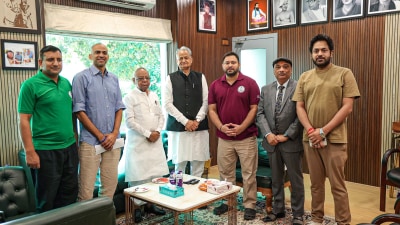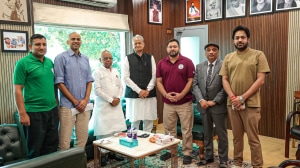Mobile trading will introduce new investors to the market
The last few years have seen online trading in India develop and grow into a mature business.
The Internet has redefined the ways in which financial transactions,including broking,are carried out. The last few years have seen online trading in India develop and grow into a mature business,with products being developed continuously and volumes stabilising.
Internet penetration in India is low,with 45 million Internet users. However,there are 127 million mobile users capable of accessing data services through their handsets. With mobile trading,investors who lack Internet connections,together with investors who cant trade through wired Internet,can now enter the market. Though most users of mobile trading may initially use it to have information at their finger tips,customers will increasingly start conducting business through this medium.
Increasing smart phone penetration and the availability of Internet browsers as a basic feature in entry-level phones is increasing the base of subscribers with access to the Internet. In the second quarter of FY10,a total of 127 million subscribers were capable of accessing data services through mobile handsets. The non-voice revenue mix of Indian wireless operators remains low at 10-11%,compared with 25-30% for mature markets due to non-availability of 3G services.
Thus,as these services become operational,we expect data mix to increase to 20-25% by 2015. Apart from mobile applications,3G services will also allow GSM operators to offer mobile broadband servicesa fast-growing market with a significant potential,given the negligible fixed broadband penetration in India. 3G spectrum will provide telecom companies the opportunity to offer real-time trading,as well as interactive and real-time equity research-based services,thus leading to increased revenues through subscription-based research services and increased data usage
A customer wishing to avail the facility should carry out a few pre-checks. The user should ensure that the GPRS is enabled by the service provider and that the handset supports the application/ portal. It is also important to note that the strength of the Internet connection plays an important role in user experience,especially during travel,though most mobile sites/applications take consideration of this aspect in design.
The variety of mobile phone devices and the technology associated in terms of operating systems,browsers and screen sizes are a few challenges faced by brokers and their software development partners.
Mobile trading is an extension of traditional online trading and works either through a browser or an application provided by the broker. The low Internet speeds on mobiles also limits features,compared to a web version of online trading.
The security of transactions pose challenges which are addressed by the guidelines laid down by regulators. The use of encryption,secure socket level security and time-based password expiry are a few key technological initiatives to secure information and transactions of end users.
At MOSL,we have launched our browser-based mobile trading system and are gearing up to manage increased customer activity in the mobile space.
The writer is CMD,Motilal Oswal Financial Services Ltd






- 01
- 02
- 03
- 04
- 05

























